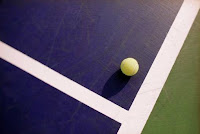
I play for four different tennis teams right now. That means, with shuffling line-ups and subs, I may have four different partners each week. In the course of a month, I can theoretically be partnered with sixteen different people!
So, each month, I may be learning how to partner and achieve success with sixteen different people. And, sixteen different people may be sizing me up, considering my tennis game, deciding if I am the kind of partner they ever want to play with again.
Consequently, I try to not only play my own game well (hit good shots, apply logical strategy), I also try to be a great tennis partner. I try to be the person that anyone would be happy to find out they are partnered with.
What makes a great tennis partner? Here is what I think it takes:
1. A great partner communicates. Sometimes a great partner has something really helpful to say, an insight into the other team or an observation about your strokes. Sometimes she has something encouraging to say, about not getting down when you're behind or continuing to play aggressively when you're ahead. Sometimes she is just talking to assure you that she is still hanging in there, playing the match point by point, and hasn't checked out on you or thrown in the towel. I can't think of a time I had a partner who I didn't like because she talked to me too much.
2. A great partner focuses on the match. Of course, that does not mean that we haven't all played with partners who talked too much. I've played with people who seem to be talking constantly. And as long as they are talking to me about the match, I'm good. But the focus has to remain on what is happening on the court. So, until the match is finished, I'm sorry but I don't want to talk about how sick your dog is or what you might make for dinner tonight. Save that for later. Right now, focus on what you can do to help win the match.
3. A great partner is always upbeat and optimistic. Guess what? Sometimes you lose. Sometimes NOTHING goes your way and no matter how well you play, the other team creams you. But a great partner will never let this destroy her attitude or ruin the match. Because, even when you're losing, you hit some good shots, ace some serves, run down balls that appeared to be sure-fire winners and get them back just one more time. A great partner sees this, appreciates it, pumps you up and just keeps plugging away with you. A great partner does not believe the match is over until its truly over.
4. A great partner is flexible and willing to change. You may not know what you are going to face in a match. What you see in the warm-up and the early part of the match, may not be what is happening later in the match after your opponents have truly warmed-up and gotten into a groove. A great partner is not tied to just one way of playing. She doesn't think anything you say is ridiculous and is open to trying your suggestions for how to turn a match around.
5. A great partner doesn't take it personally. It's only tennis after all. Nothing I say about your game is meant as an insult. And I don't take anything you say as an insult to me. So if I yell at you to switch and get the ball or I urge you to come in to the net because you're getting pinned down in baseline rallies, I only mean it as a helpful observation and not as a negative comment on your tennis skills. And I won't be upset about anything you say to me during a match. Because, just like you, I want to be a great tennis partner!
© Kim Selzman 2009
All Rights Reserved
 How do you feel when your doubles partner misses a poach? Angry? Confused? Exasperated?
How do you feel when your doubles partner misses a poach? Angry? Confused? Exasperated?


















